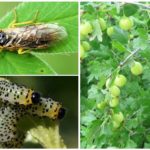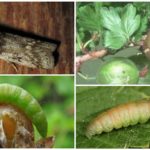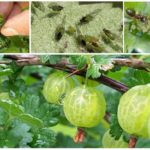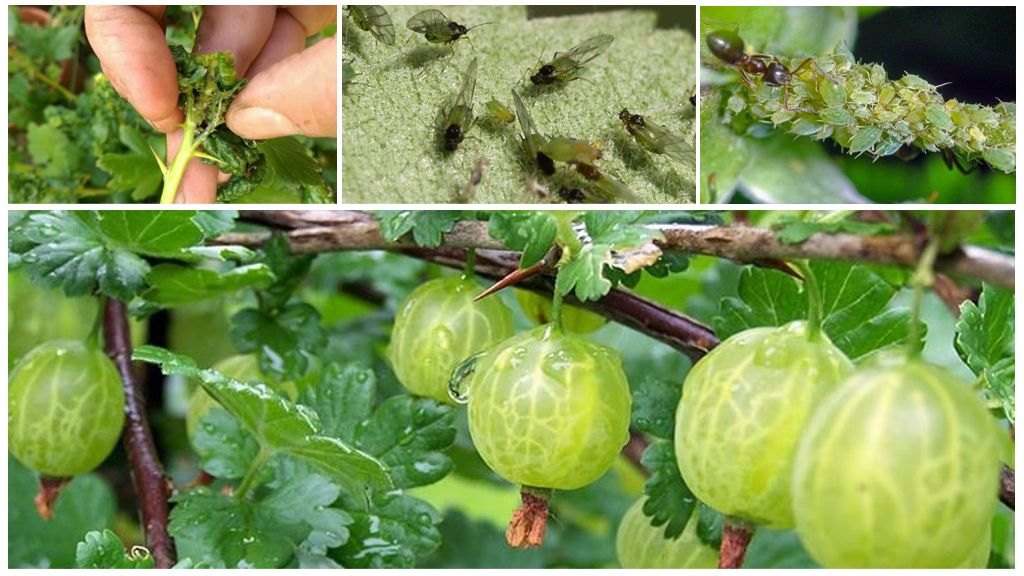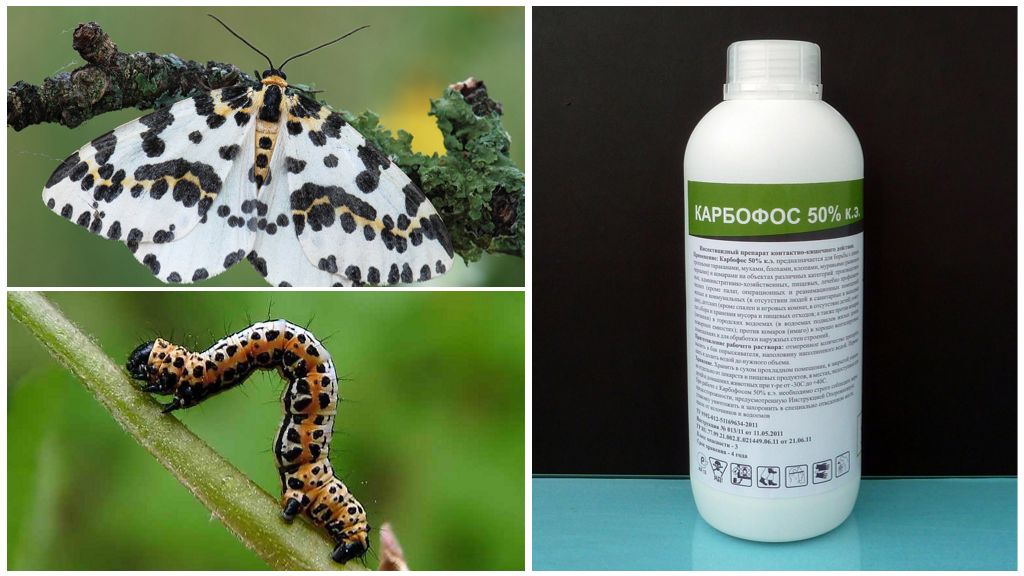How to process gooseberries from caterpillars
Content
- Sawfly on gooseberry
- Gooseberry firing pin
- Shoot aphid on gooseberry
- Peppered moth
From the first days of spring, not only nature comes to life. Various types of pests show their activity, which waited through the winter, buried deep in the soil or hiding under fallen leaves. Looking for food hungry caterpillars attack plants that have begun to wake up, thereby causing great damage to garden trees and shrubs. The shrub-gooseberry suffers greatly from them. As a result of damage to the stems and leaves of the plant, the yield is reduced. For this reason, many gardeners, gardeners are concerned about how to deal with the caterpillars on the gooseberry. To get an answer to this question, you need to figure out which insect is a threat to the gooseberry bush.
Types of pests and control measures
Consider the most common gooseberry pests that can cause serious damage to the bush. The insects of the butterfly themselves do not pose a significant danger, the caterpillar on the gooseberry carries the threat.
Sawfly
One of the most voracious and dangerous pests of the gooseberry. It also affects the bushes of black and red currants. It is a flying insect, it can even be called beautiful due to the combination of a black head with bright yellow paws. He transfers the winter to the pupal stage, and in early spring adult insects fly out of them, the task of which is to lay eggs on the underside of the leaves. After 1-2 weeks of them caterpillars appear. They damage the buds and leaves, leaving holes on them.
Important!
Caterpillar-eaten leaves are not only ruined crops. The following year, the bushes can not bear fruit, because they do not give growth and growth buds are not laid.
If the green caterpillars on the gooseberry are in large numbers, within two days the gooseberry or currant bush can become completely naked. After a hearty lunch, when the pests have already nibbled the leaves, they quietly crawl into the soil and pupate there. After 2 weeks the insect reappears, it lays eggs again and the process repeats. In areas where the summer period is quite large, the caterpillars of the gooseberry can produce at least 3 generations. Gooseberry bushes, left without a single leaflet, dry up and may die.
Feedback
Was visiting my girlfriend. She has gorgeous gooseberry bushes: large berries, beautiful green leaves are pleasing to the eye. How surprised I was when I visited her again 5 days later. There are no leaves left on the branches, only berries are hanging. According to a friend, such a metamorphosis occurred literally in one or two nights. She went to pick berries and saw that the caterpillars ate gooseberry leaves.Having experienced a little shock, she realized that it was necessary to take preventive measures in the future.
Angelina, Kuban
How to deal with the sawfly
To combat the caterpillars on the gooseberry should be a complex:
- In autumn, all the foliage needs to be collected and burned.
- The soil under the gooseberry bushes must be well dig. The larvae of insects that went to wintering as a result of such actions will be destroyed.
- Old branches should be cut.
- It is recommended to mulch the soil.
- In early spring, when there are no buds on the bushes, pour a mixture of two glasses of ash onto the ground, 1 tbsp. spoons of dry mustard and black pepper, and cover with foil. This way you can get rid of pests.
- The thermal method will also help to get rid. As soon as the earth warms up at the roots of gooseberry bushes, it is necessary to treat it with boiling water.
- You must regularly inspect the bushes for the presence of caterpillars on them. If they have already settled there, the larvae are harvested by hand and destroyed.
On a note!
It is recommended to put tansy between the bushes of gooseberry or elderberry next to them. These plants deter insects by their smell.Also, they do not tolerate the aroma of tomatoes, turpentine, diesel and other substances with a pungent odor.
Ognevka
Gooseberry moth is a dangerous insect that can kill almost half of the crop. The small size butterfly is distinguished by its front wings of gray color, on which there are brown stripes. The female lays her eggs in unblown buds and ovaries. The caterpillars that appear from them begin to devour the flowers.
On a note!
In gooseberry berries, small caterpillars are also frequent guests. The favorite food for them is the core of the fruit, they literally gnaw everything inside them. As a result, the fruits change in color and dry.
With its web, the caterpillars twist not only the foliage, but also the berries and flower stalks. If the caterpillars eat gooseberries, what to do in this case: use the available methods to destroy them.
How to deal with firestone
To destroy the tracks of the moth, you can use agronomic methods. Since the winter time the insect spends in the soil directly under the gooseberry bush, be sure to regularly dig up the ground. As soon as autumn comes, hilling is recommended to be carried out at a depth of 10-12 cm.Also need to take such measures:
- Plant mint and tomatoes around or near the plants.
- The sensible solution is to attract natural pests - ground beetles to the site. These beetles are happy to eat the larvae of sawflies and fire insects. To attract them, it is enough to put roofing or roofing felt under the bushes, which serve as shelter for them.
- When planting gooseberry bushes must be left between them enough space for good ventilation. We should not forget that the gooseberry loves the sun.
Well process gooseberries from caterpillars by old proven methods. They are as follows:
- Splashing wood ash. You need to take it in the amount of 3 kg, sift and pour 10 liters of water. The resulting solution is left for 48 hours, after which it is filtered and sprayed gooseberry bushes.
- 12% solution of dust. They cultivate the soil near the shrubs. A week later, scatter the dust (50 g) in powder form, it will help fix the effect.
- Infusion of the tops of tomatoes. Every 7 days they should spray the gooseberries from the caterpillars.
- Coniferous branches. It is necessary to collect them in the amount of 200 grams, pour two liters of hot water and insist for a week.Before spraying the mixture is diluted with water, observing the proportion of 1:10.
- Tincture of mustard. 100 grams of powder is diluted in a standard bucket of water and infused for two days. After that, the resulting solution is filtered, diluted in a ratio of 1 to 2 and proceed to the spraying process.
On a note!
As in the case of the sawfly, it is recommended to manually collect and destroy the tracks.
Shoot Aphid
It refers to a common type of pest. Her eggs in the winter remain on the shoots. With the onset of spring, the larvae appear, which feed on the sap of young leaves. As soon as insects fly out of them, they settle on the top of young shoots, slowing their growth. There is a deformation of the leaves, as a result, a clump of them is formed on the tops. Thus, the aphid creates for itself a "house for life." The gooseberry, affected by aphids, grows poorly, it has late buds.
How to deal with aphids
If this type of insect is found on the gooseberry bush, it is recommended to use boiling water and water the plant with it. Well in the fight help such methods:
- Garlic. It in the amount of 300 grams to grind, pour 10 liters of water, let it brew for a while, strain and process the bushes.
- Onion HuskInsist onion peel for 5 days (200g), drenched in 10 liters of water, and then spray the plants.
- Burdock The leaves are crushed, insist 2-3 days and process the bushes.
Feedback
My gooseberry bushes were hit by aphids. I used garlic. Made a solution, as written above and sprayed them bushes. Good help. In the autumn, under the gooseberry, I pour ashes.
Olga, Vitebsk
Peppered moth
The caterpillars of this insect completely affect the leaves of the gooseberry. They spend the winter under the fallen leaves, and in the spring they come out of the cocoons and eat them. Only cuttings remain on the bush. After flowering, caterpillar development ends, they pupate, attached to the leaves with a web. After 3-4 weeks, butterflies appear and lay their eggs on the inside of the leaves. New larvae soon emerge from them, and the process repeats, after which they go to winter.
How to deal with peppered moth:
- Just as with other representatives of insects, it is necessary to clean and burn the leaves, dig the soil.
- For processing use decoctions of the shag, tincture of chamomile.
- It is recommended for their destruction 2 times to spray carbofos.The first time, as soon as they appear on the bushes, the second - 20-30 days before the harvest.
Chemicals
Insecticides are considered the most effective drugs. Processing gooseberry bushes should be carried out 2 times per season. The first time - as soon as the buds open, the second - after the end of flowering. If the larvae appeared after harvest, the spraying procedure should be repeated. To do this, use the following recipes:
- In 10 liters of water dissolve 20 g of 50% trichlormetaphos-3. Processing is carried out at the time of disclosure of buds and after flowering. If new pests appear, the procedure is repeated.
- A solution of 10% karbofos. In 10 liters dissolve 75 grams of the composition. The treatment is carried out during the formation of buds.
- Finished products: Karate, Spark, Fufanon, Decis, Gardona and others. They should be used in early spring, until the plant blooms.
On a note!
A well-established drug called Bitoxibacillin. The drug perfectly helps against all types of pests. It is somewhat aggressive, but when used correctly, it perfectly destroys caterpillars. It does not harm plants and does not affect the yield.
Feedback
I have 5 gooseberry bushes in the country. Delicious, juicy fruits and no pests. But how surprised I was when I noticed the caterpillars after I had already picked berries. They were destroying the leaves with such ferocity that it became scary to me. I bought the money: Commander and Spark. First processed one, after 2 weeks the second. Under the bushes poured ash.
Valentina, Izhevsk
Now you know how to get rid of the caterpillars on the gooseberry using available methods, without much financial effort and cost.

